We’ll come back to hope and today’s podcast—which we’re making available to everyone—just below. First, a correction.
We posted about Israel’s new unofficial anthem, a song by Eyal Golan, and we shared a video of it. When we posted the video, we wrote that "Eyal Golan’s team did the video and the English translation.", because, well, that’s what we thought.
But a reader wrote to say that it was actually he who had done the video. His name is Josh Shron, and though he was quite explicit that he wasn’t looking for credit, the Talmud relates that Rabbi Elazar further said that Rabbi Ḥanina said: Whoever reports a saying in the name of he who said it brings redemption to the world.”
Given that this world could use more than a bit of redemption, we’re making a point of correcting our comment and of thanking Josh for his beautiful translation.
We had a Shabbat meal recently with dear friends, people we’ve known for probably something like forty years. Like all meals here, we all try hard to stay away from talking about the current situation, because, really, what is there to say that we haven’t all heard 1,000 times?
Still, it obviously comes up. At this particular meal, one of the people present said, capturing, I think, the sentiment of many:
“The hardest thing for me is holding on to hope.”
That’s entirely understandable. It doesn’t take many headlines like this one (Google translated) to remind us that this slog is far, far from over, that too many young people are going to continue to pay the ultimate price, that there will be suffering on all sides of all the borders around here, that Israel will likely continue to be isolated diplomatically for the foreseeable future …. and so on …
Which is the reason for today’s conversation.
I recently had occasion to hear a few students sharing with some visitors from abroad, people more or less my age, why they are so optimistic. Some of them were just back from months in battle. One has a husband who’s a pilot. One had worked at the Israel UN mission, and discovered in the hallways of the UN (this person also speaks Arabic, so understood what was being said in the hall and in the elevators) what genuine anti-Semitism really is. Another had been badly injured but insisted on going back into battle. And so on.
They were all deeply impressive. One, in particular, struck me with the passion of his optimism. I asked him if he could share with Israel from the Inside some of what fuels his feelings about Israel’s future.
His name is Roy (pronounced “Ro’ee”). He couldn’t say much about himself or his unit due to security concerns. So no headshot, no full bio. Just a conversation with a young man who has risked everything for this country, is in no way naive, yet still believes with a full heart that we’re going to be OK.
Roy, you may recall, is not the first young person we’ve heard from for whom history, and the dramatic way in which Israel’s shifting the course of Jewish history is what gives them strength. That’s precisely what Sapir Bluzer also said when we interviewed her along with Noam Orion.
I’m deeply struck by this strain of thought among young Israelis. I’m not sure that it fully speaks to me—at at times I’m not even sure that I agree, which doesn’t matter at all—but I’m moved by the degree that it animates them.
Because we can all use a dose of thoughtful optimism, we’re sharing this conversation with everyone.
The link at the top of this posting will take you to the full recording of our conversation; below you will find a transcript for those who prefer to read.
You know what Israelis yearn for? Well, we obviously yearn for the hostages to come back as quickly as is conceivably possible. We obviously yearn to hear that those in the hospitals and rehabilitation centers, the hundreds of people who were injured and wounded in all different kinds of ways, both on October 7th and beyond, we yearn to hear that they are healing. We yearn for victory in the south and in the war that may still be awaiting us in the north. And of course, we yearn for peace.
Victory and peace, though, are probably some ways off, as are likely elections for the Knesset. And therefore, in the interim, one of the things that Israelis really yearn for is hope. Among some Israelis, increasingly, hope feels difficult to find. Hope feels difficult to feel. There is just no way they say that if you had told us eight months ago that this long into the war, this would be the situation, that we would possibly have believed you.
But I have occasion, because of the work that I do at Shalem College, to periodically hear young Israelis, students of ours, and others who are not students of ours, speak about their feelings about the country and its future, particularly after their months of service, very often in Gaza. I had one such occasion recently where among a number of students. I heard a student named Roy, we'll just leave it at that, who spoke with tremendous optimism about the future of Israel, about the future of Israel as a Jewish and democratic state, and about the future of the country in which he hopes he, his children, and maybe even his grandchildren will continue to live.
So, I reached out to Roy and just asked him if he would speak to us about his take on the world, to tell us what happened on October 7th, where he was, what he did, what then followed for the months thereafter, and why, despite all of the headlines that all of us read in the same exact newspapers, he remains so incredibly optimistic. A lot of it has to do with his personality. A lot of it has to do with the extraordinary story of his family about which he will tell you.
There's one story that Roy mentions briefly, which he does not go into in detail, and I will just fill it out for you before we begin. Roy tells us that on the morning of October 7th, one of his close friends from the unit in which they served in the army, a unit that we're not allowed to identify on this podcast, called them up and told them something was going on in the south, and they needed to get there. They hoped in their car, they drove down to their base, they got all suited up and all their equipment. And then, says Roy, his friend went left, and he went right. And he fought for about 26 hours in various kibbutzim in the area. And it was only the next morning when he got back to base that he heard that his friend had fallen in the early hours of the war.
So, Roy, like many young Israelis, has known real genuine personal loss, genuine terror, I'm sure, in the months that he spent in combat in Gaza, but also a sense of real devotion and pride and of commitment to a state that he and many others are much more deeply committed to than many of us might ever have imagined. I'm grateful to Roy for being willing to go back to those difficult moments and to share them with us, and in the course of our conversation, to help us try to understand why his young generation is so filled with hope and optimism for this country that so many of us love so deeply.
So, Roy, thank you very much for taking the time to chat. You'll tell us about yourself in a minute, but I'm just going to start out by telling our listeners why I was very glad that you agreed to come on the podcast and chat. You're at Shalem College and did your undergraduate studies here. And I had the occasion to hear you with a group of supporters a number of weeks ago. Really nice dinner in the middle of a Machne Yehuda. It was very fun. But I was really struck by the four people, students and graduates who spoke, and by the profound sense of optimism that many of you had, and I felt it most strongly from you. And when my generation of people, whether they're immigrants, olim or they're vatikim, they grew up here, sit around, the conversation is much less optimistic. And I thought it would be really fascinating for the people who listen to this podcast to hear from somebody like you. You'll tell us about yourself in a second. And to give us a sense of how you see Israel now, and how you see Israel's future. You're the generation that's going to make families here and raise kids here, hopefully, and all that. And so that's why I wanted people to hear you, because I thought it was very powerful. It was very moving.
You and I had occasion to see each other not that long ago at the funeral of Arnon Zmora. We bumped into each other as we were all leaving. And I'll say it was very nice to see a familiar face there because it was a horribly painful afternoon. So, we care about the same things. We live in the same place, but we're very different generations. So, this is an opportunity for people to hear from, not some old guy, but from somebody who's life is ahead of him. So, why don’t you just start out by telling us a little bit about yourself, where you grew up, what you did, and then we'll start on whatever you can say, you can say, and what you can't say, you can't say, about October 7th and following, and then we'll go from there.
Awesome. So, first of all, thank you for having me. About myself, so, I'm 28, originally from Hod HaSharon.
Which is in the center of the country for people that don't know.
Yeah, center of the country, like a suburb of Tel Aviv in a way. I have an older brother, a younger sister. I'm not from a religious home, but I come from a home that is very connected to the Jewish tradition and very connected to Israel and our country.
Where are your grandparents from?
So, it's an interesting question. My father's family, my father's parents are from Germany.
And they themselves came? In other words, your grandparents were immigrants?
Yeah, they did. After the Holocaust. My great grandparents, they were murdered in the Holocaust. Their children came to Israel. My mother's family is from Yemen.
Wow.
Totally different.
So, Europe and Yemen. And they came when? In the '40s or '50s?
True, yes. It's a very nice combination. It's a very Israeli home because you have two cultures, but you can see that it feels it's the only place that this thing could happen, that Yemen and German people, Jewish people, could come together and build a home. So, I'm very proud of these origins.
So, you grew up in Hod HaSharon, and then?
And then after high school, I decided to do one year of mechina.
Where'd you go?
Mechina Tavor in Nazareth, Nazareth Illit.
Actually, it was run back then by Chikli, wasn't it?
True. Yeah.
Right. So Chikli, who's now Minister of Diaspora Relations, I think, or something like that, he founded Tavor.
He founded Tavor, of course. When I was in Tavor, he was the person. It was before it became such a big amuta [NGO]. And after the mechina, which was a very, very special year, I recruited to the army. I was in a special unit. I was a combat fighter. Later on an officer until two years ago. And now I'm a student here in Shalem.
Okay, so October 7th, where were you? What happened?
October 7th, I was in my grandmother in the 6th of October, I was in my grandmother's house. We celebrated together the second holiday of Sukkot.
The German grandmother or the Yemenite grandmother?
The Yemenite. The Yemenite in Afula. Afterwards, I went to a friend’s birthday party. Actually, went to sleep very late, 4:00 AM.
That's when I get up.
That's when you get up?
More or less.
So, we're pretty different. I was in a holiday. After 2 hours and a half, 6:30 AM, I woke up by the alarm in my parents' home in Hod HaSharon.
You mean the sirens?
The sirens, yeah. The sirens. Wasn't sure what's going on. After an hour or so, I got the video of the mechablim in Sderot.
The terrorist, yeah.
The terrorist. I called my friend, who was also a student here, consulted with him. He said we should go. He was already on the way. I told him, pick me up. We didn't really understand what's going on.
So, your unit didn't call you?
My unit didn't call me. No, it was only two months after I finished my service. So, I wasn't even in the list because it was a gap that I wasn't...
Right, you hadn't been processed to be part of the reserve.
Exactly. So, no one called me. So, I just took a little bag, put a toothbrush, underpants, and a book. That's how optimistic I was.
That's very Shalem, right?
Very Shalem, yeah.
Toothpaste and a book.
And a book. No matter what happens, always a book. We drove to the south, both of us. I got to my base around 9:30 AM. The image there was already, I can't say clear, but it was understanding of a big event. People were running from places, trying to get equipment. I found that I got myself all the things needed for fighting and went with my friends to, we started in Mahane Re’im.
Which was where the festival was, the music festival was.
Yeah. Re'im had three places. It was Mahane Re'im, which was the army base. There was Re'im, the Nova Party, of course. So, we went to the base where terrorists conquered.
They had actually captured the army base, right?
Exactly. That was my starting point. After a few hours of fighting over there, we continued to Be’eri, Kibbutz Be’eri. We've been there until the morning after. It was pretty hard images. Things I never thought I will see in my life. You know fighting within Israel, side by side, two tanks inside a kibbutz, it's something that you think you will see only in the movies. It was a very, very hard experience. And later on, this was the open for four months in miluim [reserve duty].
So, you were in the reserves for four months?
Four months.
All of it in combat?
All of this in combat.
All of it in the south?
All of it in the south. Different places in the south, but in the south. And after four months that were pretty extreme, they decided to let most of the reserves back to routine. And since then, I'm back, back in school.
How much time did you have between being in battle and being in class?
Less than a week. Less than a week…
How did that work? I mean I know that a lot of our students were in the same position, but I'm curious for our listeners to hear. I mean, battle is the crucible. I mean, you're just in the most intense experience a person can probably be in. And then a week later, you're supposed to be sitting in class and thinking about whatever text you're reading. How does the brain work?
It was pretty hard. First of all, there is, one of the things that is still very crazy, in my opinion, is the fact that the war isn't over. There is no closure. It's not like you've finished something, and you start a new chapter. Well, you do start a new chapter while everything is still going on.
The beginning was hard, but it was very surprising to understand that I feel in a way that things are connected. Because first of all, I'm still a soldier. Whenever the army will call me, I will be back. So, in the last three months, they called me three times. So, it happens. But I think that for me, when I look at what happened, I'm not talking only about the 7th of October, but it feels as if we're in historical time in the matter of the Jewish people and the state of Israel. I'm talking also about what happened, about the reforma mishpatit.
The judicial reform.
Exactly. The big kera.
The tear.
The tear we have within our people. And I see everything is connected, in my opinion. It was hard for me to start studying in Shalem and in university at all because I come from a routine of doing, and it always feels as if there are many things to do. Which there are. And sometimes when you study, it feels as if you are taking a step back. But the war was so horrific, in my opinion, that it made me understand how crucial it is for, at the moment to fight, but in the long term, to create a new vision for our country, for our people.
It started before the war, and the war made me understand how crucial it is because I think during the reform conflict, we still lived in the conception that Israel will always be here. The war also helped me see that what we have, we cannot take for granted. And we all should work very hard to continue this incredible miracle that we have a home here in Israel. If I need to make a closure to what I'm trying to say is that I'm ready every time to be called back to the army. But all the time that I'm here, I'm having this thought that my studies is also a way to prepare myself for a future of trying to take part in making our place a better place. So, I think it helped me deal with that coming back to routine.
Tell me something about your vision for this country now. I'm going to put a purposefully negative spin on things, but you can swat down. It's like a straw man. You can knock it down. If you would have said to somebody on October 9th, eight months in, we're going to have dropped this much munitions on Gaza, and Hamas is still going to be functioning in some way, and they're still going to be able to fire rockets at the otef [envelop] and other places as well. You would have said to somebody eight months ago that we still wouldn't have most of the hostages back. And you would say to somebody eight months ago, and then the north is going to be on fire, and we're not going to know what to do. It's going to be 100,000 people that live in the north who can't go home, who no longer believe the government that they're ever going to be able to go home, at least as far as the eye can see, because we haven't figured out what to do about Hezbollah…
Basically, say all the things that still goes wrong.
Right, right. And our international standing is not what we would like it to be, to put it very mildly. And, and, and…. Now, if you had said all of this to somebody, including me, by the way, in the middle of October, we would have said, that's nuts. I mean, it was a horrible thing what happened on the 7th, but at the end of today, it's a bunch of terrorists, and we're a standing first-world army, we're going to win. It hasn't happened quite the way we thought it was going to happen yet. It's proven much more costly and much more, taking much more time.
And you have a profound conviction that there are great days ahead for this country, and that this country is ready for a new vision, and we're going to see this through. And I just would love for our listeners to hear as somebody like yourself in your late 20s in a very special unit in the army, a devoted soldier, a combat veteran, deeply committed to this country. Talk to us about the future that you see.
I'll start with the past.
Okay.
Because I'm not a prophet, but I'm not always optimistic. That's the truth. Because when I hear what you say now, I also get depressed. Because me also, eight months ago, would never believe that we'll still be in this mud after so much time. But if I need to connect it also to my studies is that there are two things that I do when I need to breathe and feel a little bit more calm.
The first thing started a month ago. I was asked by someone in the Holocaust Day. He said, listen, I'm doing a Holocaust, for Holocaust survivors, we're doing a ceremony. We'd love you to come and talk because those great people are pretty afraid of the future. They feel as if, I don't like to say that the never again was broken, but something was cracked in the way that they captured the strength of Israel and the promise never again.
I said yes, but inside I was petrified because how can I speak in front of those people and what will I say? I want to say something that I believe in. And in that point, I'm not very sure that I can be. I can tell them something that would make them believe. So, I started writing for myself, and I wanted to introduce myself. When I wanted to introduce myself, I wanted to talk about my family. I just wrote a short passage about my family history, and it hit me. And then after I wrote it, everything else came straight. I wrote, my grand grandfather and my grand grandmother were murdered in the Holocaust, in Auschwitz. Their son recruited the British Army to fight against the Nazis. After this, he made Aliyah.
That's your grandfather.
My grandfather. And he recruited to the Haganah and also had to fight in the Yom Haatzmaut, in the War of Independence. He built this country. And he met my grandmother, and they had two wonderful children. His son, many years later, as a tank fighter, had to fight in the Yom Kippur War.
That's your father.
My father. And his son, which is me, is now fighting in Haravot Habarzel [Swords of Iron War]. It helped me for a minute to feel as if I'm looking at the last 100 years from a bird point of view, and to understand that we are a part of something greater than us, and that hope can be found also in these kind of times. Because I see my father, I saw my grandfather, and there were people that weren't naive. They have been through very hard things, but still, they've been through it. I feel as if Haravot Habarzel [Swords of Iron War] is very different, and we can speak about specific challenge, so, I don't have an answer how we're going to finish this. I'm not a big commander or a politician or strategic… I'm only 28, and I don't know much…
They also, by the way, don't have any answers either.
I guess they don't, as we can see. But when we look from our perspective now with all those things that's going on, we lose hope in the minute we hear all those things. But to remember that people before us, not very far ago, my father, my grandfather, they have witnessed terrible disasters. What changed it? I believe that they looked ahead. First of all, when those things happened, they fought back. But after it, their energy was directed to create, and for a better future. And they had a belief. They weren’t as far as we are from remembering that we have no other place. So, this is the first thing that helps me being optimistic, knowing that I'm only a part of a larger story that all the time is going through hard stuff. “Dor dor v’dor omdim aleinu l’chaloteinu” we say.
Right, in every generation, as we say in the Haggadah, they rise up against us to destroy us.
Exactly. The other thing that helps me being more optimistic, I'm saying to my friends, stop looking up, look around you. Because we are in a generation that it feels as if we lost leadership, not only in Israel. I believe in the entire world we have this kind of feeling. And since when is the leaders of the politicians and the politicians are the ones to take hope from. We want them to be.
But when I look at the people around me, my fellow friends from the army, my friends from the mechina, my friends from Shalem, I see so many good people that have good values, that have the will to make this place better. Two years ago, I was pretty nervous because many of them talked about... It was like a feeling of one little global village, and Israel, yes, Israel, no. We don't always feel connected to this place. But I think something happened after the 7th of October that Golda Meir once said that the Jewish people's greatest weapon is the fact that they have no other place in the world. In the last 10, 15 years, I believe that this secret weapon was cracked because people felt as if their... if Israel is not good, if the Milky is more expensive in Israel, we'll go to Berlin.
Milky is chocolate. Everybody should know. Everybody compares the prices of Milkies in Israel and in Berlin, and it's cheaper in Berlin.
It was a big protest in Israel. But I feel that today, if there is one, and I'm saying good with quotation marks, that might happen in the 7th of October is the fact that it gave us a reminder that this is our home. I see many of my friends that talked about Israel in that kind of way, now change their talk about how they can be effective to make this thing that calls the Jewish state, Israel, a better place, and they feel as if they have a future only here.
So first of all, that's incredibly inspiring, at least to me. Let me ask you this, though. Do you see your generation, everybody talks about, you weren't in a tank. You're in a different unit. But everybody talks about the guys in the tanks. They were in the tanks for 130 days together, 160 days together, and one is right, and one is left, and one is religious, and one is secular, and one, this and that. And they all say, if we can do this together in a tank for four months, then whatever divided us last year during the judicial reform, we're just not going to let it divide us now.
Now, we're eight months into the war. We're several months after most of the reserves were released. And some of what the toxicity, the poisonous nature of the discourse from last year, we're beginning to feel it come back…
And it will come back.
It's going to come roaring back?
Yeah, I believe it will come back, but I'm not afraid of it because things does not change in 180 degrees in a year. It was fascinating for me to study that even the French Revolutionary eventually happened only, the final Republic was conducted only 100 years later. Many things happened in-between.
We need this patience. I believe that the 7th of October might spread the seeds to change the way that we communicate and the way that we capture our disagreements and the place of Israel in our lives. The seed has been spread. Now, we need to give it time. Those who would be disappointed to hear the hard dividing way of talking next year, it won't change. It will start to change. It will take time. And this is why we need patience.
Part of what you're saying is very similar to what you said before. It's about the 30,000-foot perspective. A friend of mine, actually, I sent him a WhatsApp, I don't know, a couple of months into the war when things were really not looking so good. I just sent them a little ironic note. He also made Aliyah way before me, but he also made Aliyah. And I wrote him, and I said with a wink, this was not in the Aliyah handbook. And he wrote me back instantaneously. He's a very smart guy. He wrote me back, no, it wasn't in the Aliyah handbook, but it was in all the history books. Meaning if you thought we were going to be the first Jewish generation to live outside of history, we were pretty stupid and naive.
So, partly what you're saying is the same thing in two different ways that your father fought, your grandfather fought, your great-grandfather, unfortunately, was not able to fight and was killed in Auschwitz. So, the story of your family's generations since then is a story of incredible progress. And to say nothing of your family that came from Yemen. I mean, if you look at what Yemen is now and you look at where they are now, obviously, coming from Yemen to Israel was a story of extraordinary progress also.
And so, you're saying you have to have your eye on the long ball. And the same thing is true with the toxicity of the kinds of conversations that were happening. We're going to have ugly politicians. We're going to hear ugly things. We're going to keep fighting about this and about that. But you're saying your generation, people in their 20s and 30s, having their eye on the long ball, we're going to change this.
Say something about the vision that you have. You said you came back from the army; you came back from the war. You realized that it was important to begin to think about your vision for the state. So, I don't necessarily mean Roy’s vision for the state, but your friends, your friends from the mechina, your friends from your unit in the army, your friends from here at Shalem, your friends from wherever. When you guys sit around with a couple of beers, if you talk about what this country could become, what do you guys have in mind?
It's a big question because many of our talks is about today and not about the future in our days. But I believe that most of my friend’s vision is not very different from your vision about Israel's future, which is a place that, on one hand, gives you the liberty to live the life that you believe, the way that you want to live it, but on the other hand, gives you purpose and something that is greater than yourself.
How to do it is a big question because what would, part of the things that we're trying to avoid in our conversations is the arguments about the how, because we all feel as if we don't know enough to structure the how. But many of us would just want things to continue the way they are now with the ability to...
To include or to encompass.
Different opinions and people who think differently. Because one of the things that were lost in the last 10 years, I think, is the fact that we don't trust each other. We feel as if each one is trying to force the other side with what he believes. When you sit with someone who thinks different, you find out that you can solve most of the things together. I know it's pretty; everybody knows it….
Everyone says that 80% of Israelis agree about 80% of the issues.
Exactly. So, I think what we'd like is this 80% to be more active and would like to see that people, instead of only thinking about their homes, to understand that we need good people out there, not only in politics, also in politics, but that people would start looking at outside and not onlu the inside. I I think that this would start a process, if speaking generally.
Let me ask you a couple of specific kinds of policy questions, just you and your friends. We could do them quickly. Haredi Service in the army? Should it happen and is it going to happen?
You're asking policy questions that are very complicated, so I don't really…. Basically…
Policy questions that matter are complicated.
Okay. I believe that we live in a country that everyone needs to give something to the country. I believe it's also educational, and we're a small country facing many threats. It's important. Whether it's in the army or whether it's in a different kind of way, I believe that every citizen should be given something to society. So, in a way, I say yes, but I also understand that it's a very difficult subject that we need not to force it to them, but to think of a long process that would make it work together.
Okay, that's actually very interesting coming from a person that's basically from a non-religious family because you would expect somebody from a non-religious family to say, “Yeah, why should I have to go if don't have to go?” But your view is much more nuanced than that.
Yeah, because I believe that everything that comes by force…
Doesn't work.
Doesn't work in the long term. There is something that we need to figure here about how to, from one hand to understand their needs, and on the other hand, to make them see ours. This is exactly what needs to be changed. Instead of trying to defeat the other side, we need to find a process that understands how to make us partners for that stuff. I know many people will hear it and will say, oh, he's very naive.
I know you and you are not naive.
No, it's not… I haven't put enough thought to this question about how to do it with the Haredim, but as a perspective of a way to get there, I believe that it should come from after a big process of understanding.
Okay, so let's take a more immediate issue, which I know from a previous conversation that you and I have had, you actually think that the hostage situation is a huge win for Hamas, not only because they're human shields and they can surround the Sinwar and theoretically keep him safe or whatever, but because as long as there's a hostage situation, you argue, we're going to be divided.
In other words, the hostages is the new judicial reform. If last year, what divided Israel was judicial reform, now, I think the main issue that divides Israel right now, at this moment, could change, obviously, but the main issue that divides Israel right now is make a deal, don't make a deal with Hamas, what kind of a deal, whose deal, et cetera, et cetera. And you feel, at least I remember you're saying to me, that that's the advantage that Hamas has by having hostages, not only the human shields, but they can keep us very divided.
When you think about that, I know you don't have any magic solutions. It's a horrible situation that nobody has any solution to. But when you're talking with these people over a beer or a pizza, and you're talking about the hostages, which is obviously a horrible human tragedy. And you and I both understand that what everyone thinks of this government, and I'm not a huge fan, they, of course, want the hostages back also. There's nobody in this government that doesn't want the hostages back. Is there anything beyond that that you would share with our listeners about how your generation is thinking about this?
I will speak for myself, and I will say that, first of all, I think we need to try and look at Hamas from Hamas's eyes and not from ours. When I said what I said, I said, first of all, I tried to ask myself, why did Hamas attack on the 7th of October? This question is fascinating for me because Hamas, I believe, never thought he would win in a military for the long run.
He's not going to destroy Israel.
He won't destroy Israel. He doesn't have the force. So, what did he try to do? I believe that Hamas, and it's common to all those who want us gone from here, he's trying to exhaust us in the long term. When I say long term, I'm not even saying in a year from today. I'm talking about years from today. It's interesting because I remember before the 7th of October, a conversation with my friends, whether there will be a war or not, because many people said, no one will attack us. We are very vulnerable because we fight with each other. But maybe they won't attack us because they would let us destroy ourselves. It reminded me a quote of Josephus Flavius, when the Romans, before they attacked Jerusalem, before they destroyed the second house, they said, wait, let them first of all, eat each other. Which is what happened. And we will only give the final strike.
What's very special about our people is that when we have threats from outside, we became very strong from the inside. I think that Hamas knows he will never make a deal because he understands that the way that he can hold both things, threat from outside with a threat from inside, is that he takes us from the outside and he always keeps something that he knows we'll eat each other about. And it's the hostage issue.
So, I'm not sure to say how can we do it? But I believe that to make a deal with Hamas, is not pretty in our court because no matter what we offer, they will say no. This is why I believe that we need to continue and find creative ways and to continue to put very hard pressure on Hamas because if there will be a deal, it will come not because we'll offer something that we didn't offer yet, but because we'll find a way to create such pressure, either from diplomacy, either from army force, either from any other thing that we haven't thought about yet that would make them eventually give this hug advantage that they have by keeping them with them.
So, part of what they want to accomplish is actually working because it is actually dividing us.
It's totally working, not partly.
Okay. In another conversation that you and I have had, we talked about hope. You have, I thought, a very unique take on the role of hope in Israeli society now. By beginning to wrap up as a way of beginning to wrap up our conversation, say something about the place of hope in Israeli life these days.
I'll start by saying that hope, losing hope is what frightens me the most. That's why before the 7th of October, I was less optimistic than what I am today because I felt that we lose hope. People are... Because the fight within, divided us so hard that I thought that people will leave this place because it touches everyone so deeply. It was interesting for me in one of the times that we sang the National Anthem, it hit me that our National Anthem starts with conditional words, “as long as”. “As long as”, as if we tell ourselves that this place has a condition. As long as Jewish soul yearns within us. I said, wow, I'm not sure if it yearns within us anymore.
What's the name of this anthem? Hope, the hope, Hatikvah. For me, losing hope is the start of the end of Israel. So, my take on hope would say that in some periods of life, hope is very frequent. You don't need to ask yourself why you're hopeful. But in many times, it's not, like our days. But we cannot accept it that the hope was lost. I believe that hope is something that we need to look for.
We have almost a positive commandment to be, to find hope.
To look what we can find hope, where we can find hope. If we look at our leaders and we don't find it, we shouldn't say there is no hope. We need to ask ourselves, where can we find hope? So first of all, I would like to say that I believe that just putting in mind to ask that question helps finding some hope, not in our leaders, but maybe in our neighbors, or in our army, or in our commanders, or in our children. And second of all, it says “darshani”, what can I do to create more hope for my people and for myself?
So, I would like people to go out from this podcast asking themselves, where can I find hope? Because I believe that this is the most significant thing that we need to create in our days, hope for better days. And once we'll have this, we'll start to rebuild ourselves for the future, for a better future.
And I think my generation actually needs to listen to your generation. And if we if we got tired and our kids are all grown up and our kids are now in the army and we're worried about our kids, in the same way, I'm sure your parents are worried about you. It's hard.
I think the different generations just need each other. You derive tremendous meaning from the story of your parents and your grandparents and the horrible story of her great-grandparents. Our generation, I think, derives tremendous meaning from the fact that we were able, in my particular case, at least to choose to be here. We weren't leaving anything. We were coming to something. It was not about leaving anything behind. It was about embracing this. And it's been a hard couple of years. It's just been a very sad couple of years. And partly, I think maybe it's that my generation, because you said this is a long game, this is not a one-year game, and this is not a five-year game. It may not be a 10-year game. It could be decades-long game. In which case, my generation may not live to see us coming out the other side of the tunnel, and your generation will.
And I think that what we have to take from your generation is it doesn't really matter whether we'd live to see us coming out the other side of the tunnel. We have to be part of the effort to keep going through the tunnel, and to meet with, and to work with, and to hear people like you and all of your colleagues, your fellow students here at Shalem who are really extraordinary people, is I've always said to everybody, that's what makes this place the best place in the world to work, because you actually end up going home at the end of the day feeling that you have a renewed sense of purpose and a renewed sense of belief in the country.
It was just important for me, after I heard you and your colleagues talk to that group of people a few weeks ago in Machne Yehuda, for them to hear somebody who's been at war, who's faced really horrible, seen horrible things and faced real danger to be so positive and so determined to see this country through. I wanted people to hear your voice. They did. I'm just very grateful that you took the time in the middle of everything to share these thoughts with us. Hopefully, the next time we sit down and do one of these, we'll be able to say how much better things have gotten since the last time that we had this conversation.
I hope so. I really believe that hope is a matter of perspectives. There are many things. We just need to stop looking only up, look around, and we'll find it, and we'll go through it eventually. Thank you very much for having me here, Daniel.
Thank you for taking the time. I really appreciate it.
Music credits: Medieval poem by Rabbi Shlomo Ibn Gvirol. Melody and performance by Shaked Jehuda and Eyal Gesundheit. Production by Eyal Gesundheit. To view a video of their performance, see this YouTube:


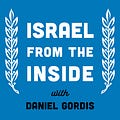



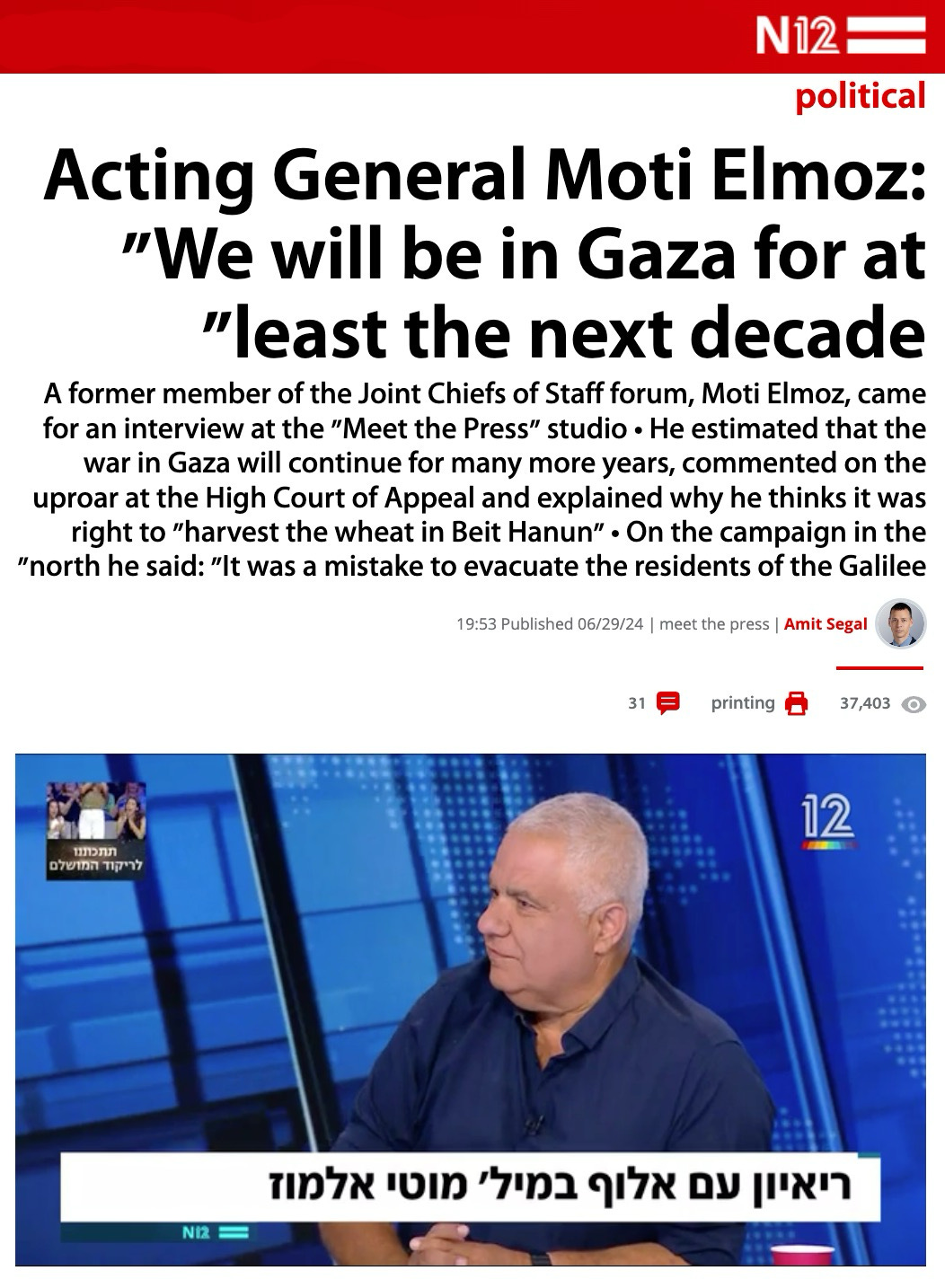

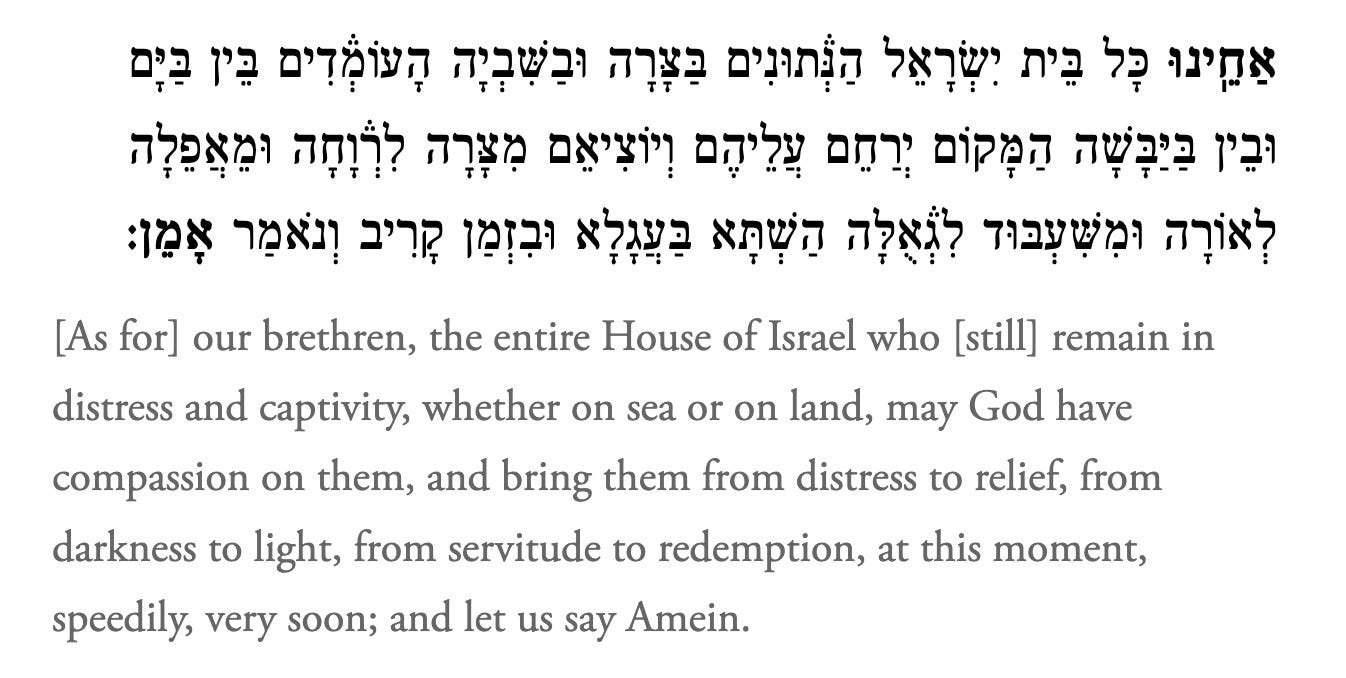

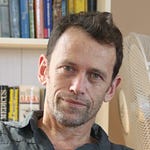
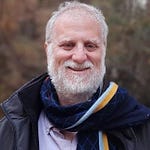
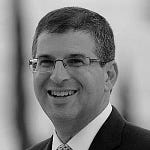
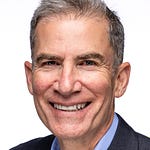
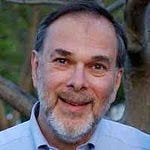


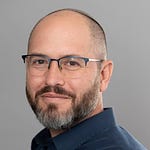
"For me, the hardest thing is holding onto hope"